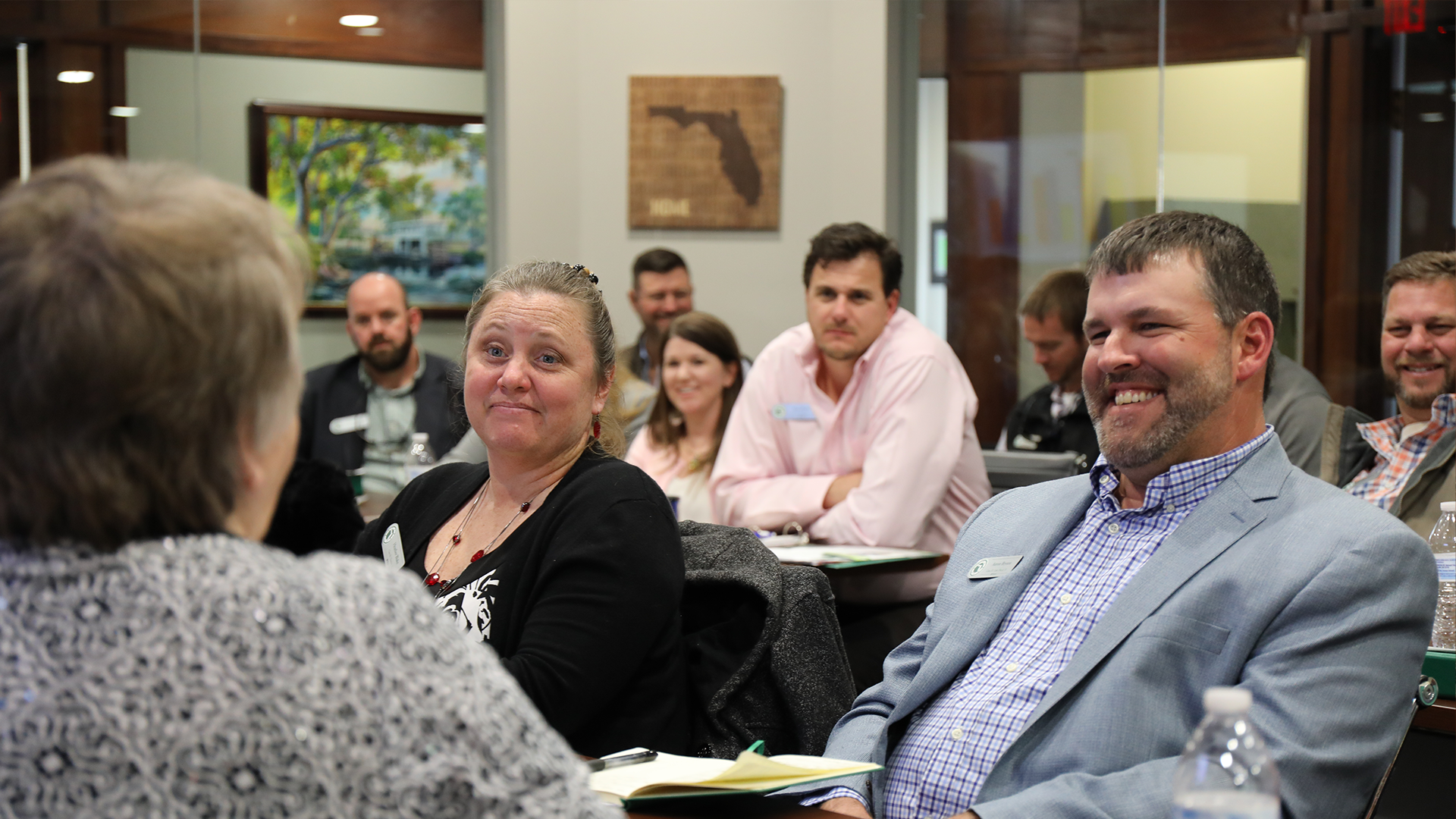
Building Resiliency and Relationships
Seminar II kicked off in beautiful Perry where we learned from fellow Wedgworth Leadership Institute alumni and supporters about the state’s forestry industry. The “Forgotten Coast” suffered tragic losses as a result of the impact of Hurricane Michael. The timber industry in North Florida will see a decline in the production of trees for the next 18 to 50 years in addition to approximately 1.3 billion dollars in damage to the timber. It is costing many landowners more to clean up and replant trees than land is actually worth. The trees that survived the storm are being used for chips, saw timber, plywood, pulp and biomass. To date, the area has received no federal money to assist in the clean up after the storm. The forestry industry in North Florida are resilient and are doing the best they can with the resources available to them.
Tallahassee is a constant buzz while in session. We had the opportunity to hear from a few of the best during our visit. Mike Joyner gave Class XI a lesson in state government and explained that Florida is a very diverse state. He stressed the importance of knowing your priorities and staying laser focused to accomplish those goals whether you are in Tallahassee serving or at home on the local level. If you are not already involved in your commodity-specific organizations (FFVA, Farm Bureau, FNGLA, Turf Grass Assoc, Florida Strawberries, etc.), it is imperative to get your voice heard. It is as simple as waving signs, donating to the cause, or even going door to door advocating.
Marian Johnson is a wealth of valuable information having been involved in every presidential and state campaign since 1964. She noted how Florida has changed and will continue to change with the ever-growing population. It was discussed how the President made one tweet about then Gubernatorial candidate Ron DeSantis and the polls quickly changed, eventually winning the election. The key takeaway from this session was to get to know your House of Representatives and Senators; let them hear from you often, don’t just call when you need them—build relationships.

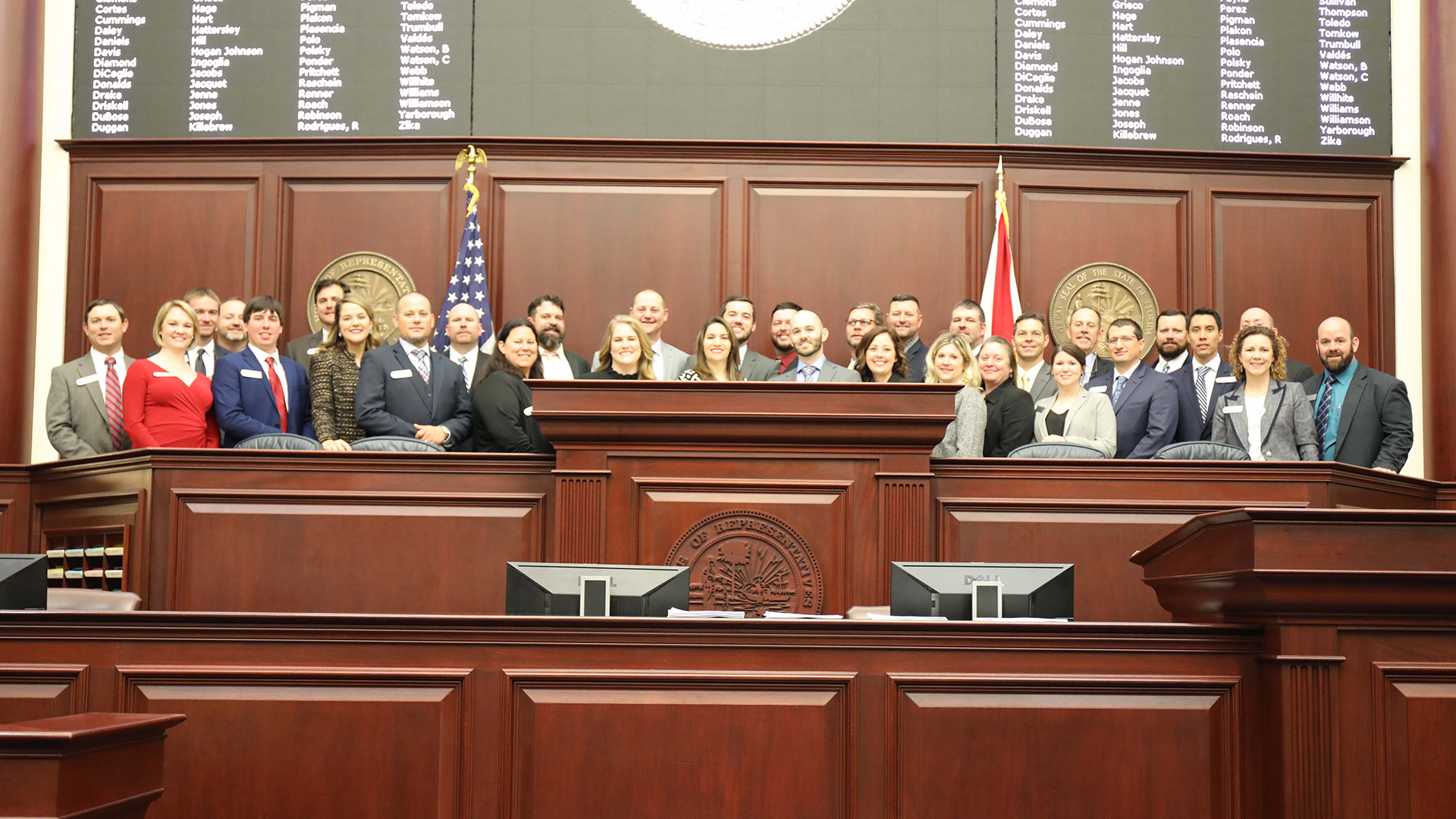
What is Your Leadership Story?
The Florida State Capitol is a busy place, especially during the legislative session. On day 2, Class XI toured the House of Representatives Chamber and heard from a diverse group of leaders. Amongst the diversity, they all share a passion for the people they represent.
Their passion comes from a lifetime of experiences. We heard stories about apprehending fugitives, water policy, cybercrimes, opioid abuse, preserving green spaces, and e-Verify.
So, what is a leader?
- “A leader takes care of the people they are in charge of.” – PJ Joanos
- “A person who leads.” – Merriam-Webster
“Part of being a leader is knowing who you are, what you believe in and why you believe it,” says Senator Albritton. One of the most important parts of your leadership story is your WHY. Also, from Senator Albritton, “Be who you are, not someone different around different crowds.”
What are your fundamental beliefs, or core values, that make you who you are? Maybe you value integrity, honesty, resiliency, commitment, humility or passion. Establish your core values and write them down.
Once you know your WHY and your core values, you’re ready to write your leadership story. In her article titled, “7 Steps to Creating a Leadership Strategy,” Terri Klass recommends following these steps to create your personal leadership story:
- Think about your past.
- Identify critical turning points.
- Write it out.
- Decide how you will communicate it.
- Share it first with a safe person.
- Honor the feedback.
- Promote your story and have fun.
Being a leader is not always easy. How do you stay on top of your game? Mr. Joanos says you learn a lot about someone when they are under stress. As a trainer for the US Marshals Service, he recommends the following strategies for stress management:
- Practice tactical breathing techniques
- Implements a crisis intervention team – a/k/a “hug squad”
- Find something to live for other than your job
- Practice reflection in good and bad situations – you should always discuss what went well and what can be improved upon in the future
If you desire to lead or be a better leader, read Courage to Lead by Charlie Farrell. This short story about life and leadership may lead you to question whether you have the courage to lead.


It All Runs Down (Capitol) Hill
Growing up, what was your greatest responsibility?
- Taking out the trash?
- Washing dishes?
- Feeding the family dog?
Presumably, it is safe to say the responsibilities were minimal. And, if you did not get around to it, someone else most likely would. Majority of folks had a solid safety net – when things got out of hand, our parents and/or adult figures were always there to help clean up the messes.
But, in our modern lives, who cleans up the messes?
With a presidential election approaching, we hear candidates going to great length to discuss the many things they can do for our country – the ways they can make our lives better through governmental power.
After spending time in Tallahassee during Seminar II, we heard very similar messages at the state level. Capitol Hill is filled with platforms, policies (and politics!) that help to shape Florida’s socio-economic and geo-political landscape.
But national and state figures are not the catch-all when it comes to resolution. Seminar II’s community and local commerce visits, which followed our Tallahassee tour, made something abundantly clear – the responsibility still runs down (capitol) hill.
Here are just some of the “messes” we encountered:
- a deflated economy in the town of Quincy
- a town’s tourism industry decimated by oil spill scare and hurricanes in Apalachicola
- an oyster industry essentially razed after overharvest following the BP oil spill
- the unincorporated town of Panacea taking a staggering blow by Hurricane Michael
- domestic and substance-related issues in the Wakulla County court system
Does it sound bleak? It very well could have been.
Had the “messes” been left to greater powers at be or, perhaps, just left alone to sort themselves out, this would be a morbid tale.
Instead, it is a story of empowerment and encouragement.
- In Quincy, we witnessed the economic growth and development brought to town by local nurserymen who joined forces and established Trulieve – a local cannabis operation.
- In the wake of Hurricane Michael, the Apalachicola community prepared their town for their local seafood festival. Defying the odds, it was held mere weeks after the storm and signaled the town was back open for business.
- We learned about the rebirth of an oyster industry that should be all but non-existent if not for local efforts to implement aquaculture and oyster farming practices.
- We heard heartwarming stories from business owners and citizens in Panacea about how, despite being an unincorporated town, the locals joined forces and worked to restore the community following Hurricane Michael.
- Our tours ended with a caring message from the Wakulla County Judge, who made it her personal mission to help the struggling members of her area as they found themselves in her court system.
And these are mere highlights. Each of our visits was riddled with proud community members and leaders, who shared stories and wisdom that reflected the fortitude of the “Forgotten Coast.”
It was both encouraging and inspiring.
And please allow me to clarify – this article, in no way, detracts from the roles of state and national officials. There is a true need for good, strong individuals serving in these capacities and our industry truly needs more representation at these levels. However, not all of us will find ourselves in the political arena.
But, while that may be true, each one of us has a role to play in our counties and communities.
So, spend a few moments reflecting on: your community, your business, your home.
What sort of messes do you see? Who will clean them up?
It might need to be you.

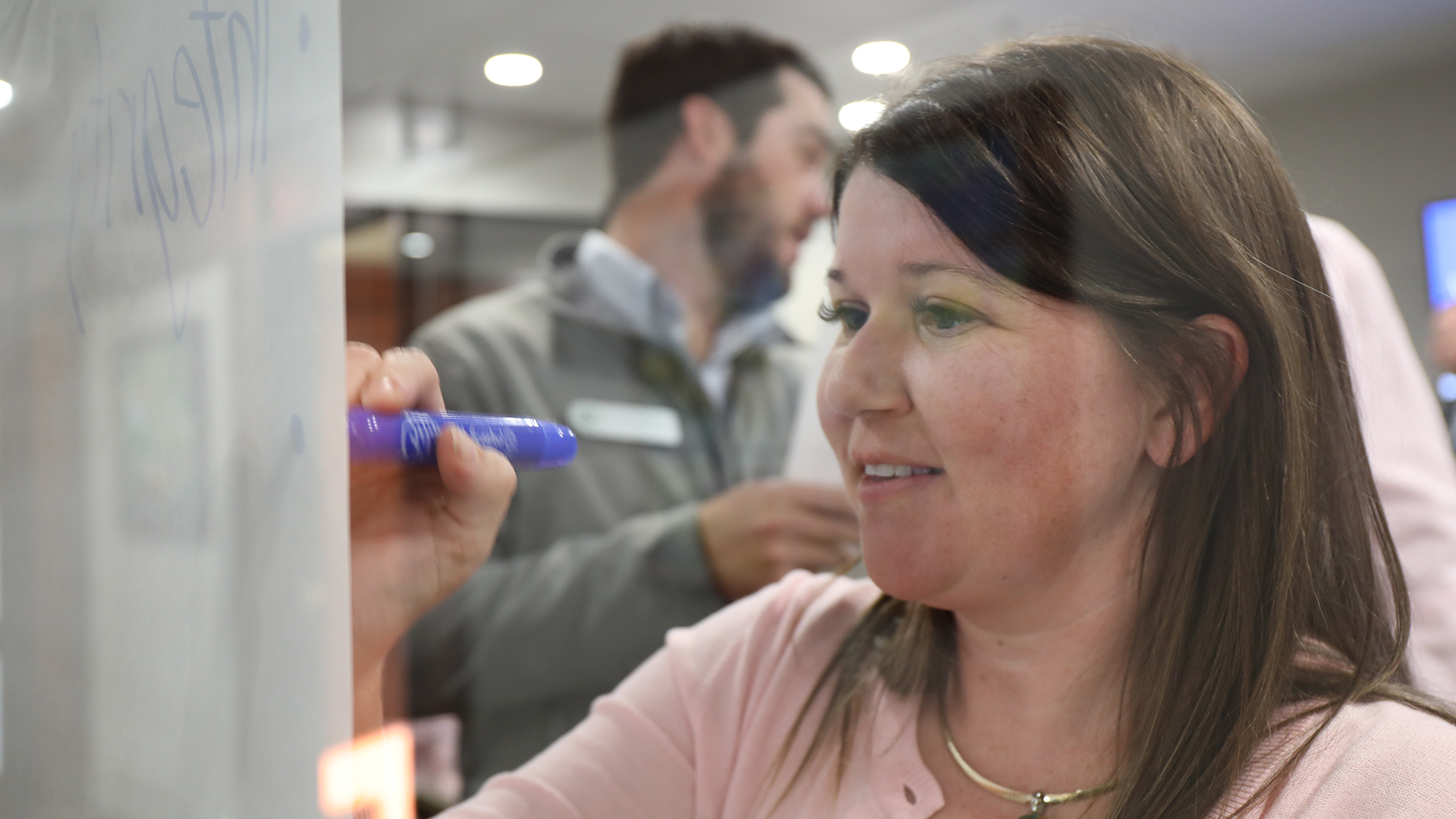
Creating Class Core Values
Creating Class Core Values – Only One Step in the Process
One of the many traditions for each class of the Wedgworth Leadership Institute is the articulation of class core values and the election of a tribunal. Class XI engaged in those activities during Seminar II in January. As all WLI alumni know, the tribunal dates back to Class I and is an important self-governing resource for the class. It’s rare the tribunal is officially used as the entire class participates in self-governing through keeping all class members, including themselves, accountable to the core values and standards of their class and of the program. In most cases, self-governing is done through one-on-one conversations providing encouragement as fellow colleagues walking down this same path of leadership and personal growth.
The class had an outstanding discussion around the idea of core values. It was outstanding not just because of the core values they settled on, but due to the engaging discussion and struggle in which they engaged. It is too easy for individuals and groups, including those with excellent leadership experience, to pass too quickly over a deep conversation about core values – What are they? Why do we need them?
The value of intentional thinking and conversation about core values is it provides a space for members of a group or team to learn more about each person’s standards. Often, we find that two or more individuals are using different words to describe what is discovered to mean much the same. Without time and intentional dialogue, that commonality might get lost and might be seen as a conflict.
The work around group core values is an instance where the process is just as important as the final product. The words that make up the core values communicates not only to this class, but to others the guiding principles of the group. The process to identify these core values hopefully gave each member of the class the opportunity to focus on this and engage in meaningful conversation.
As has been mentioned to the class on numerous occasions, the purpose of WLI is not to make the participants leaders – they already are leaders. The purpose of WLI is to build the leadership capacity for agriculture and natural resources by investing purposefully and intentionally in the personal and professional growth of these individuals. I would argue that one of the foundational aspects of this purposeful and intentional investment is discussion, and hopefully modeling, around core values and accountability.
Growing up listening to Paul Harvey on the radio I always looked forward to his segment. He was a great story teller and as interesting as the story was in the beginning, I knew as soon as I heard those famous word, “now, the rest of the story,” I was about to hear the most important parts of the story and the lesson it was to teach me. The idea of accountability is “the rest of the story,” when it comes to our conversation around core values. It is the linchpin that connects the core values to meaning, to learning, and to personal growth. Without accountability, core values are not worth the ink used to print them or the breath used to say them.
Opening oneself to another person, to say, “I will let you hold me accountable and I will hold you accountable” is not easy. However, time and time again many top-quality leaders share how they had this inner circle of friends, mentors, and/or colleagues to which they made themselves accountable. Do I think someone could be a leader without some form of self-imposed accountability? Yes. However, I would contend strongly that anyone who wants to be that “next-level” leader – that leader who transcends what they are capable of individually – having a network of persons with whom you are painfully honest and they with you, is critical.
I’ve heard people insist they don’t need any form of external, self-imposed accountability. They argue they are a “professional and will remain accountable to themselves.” Although I appreciate the independent and self-sufficient nature of this feeling, my experience tells me that thinking is flawed. This is not to discount the quality of the character of any individual. It has just been shown time and time again in multiple contexts – finances, religion, management, entrepreneurship, etc. – that having a small group of trusted individuals who you know will call you out, helps everyone reach long-term goals for business and personal growth.
This is my challenge to each member of Class XI, to each WLI alumni, and most importantly to myself– lean into accountability. Take the responsibility your classmates have honored you with to hold them accountability with great humility and grace. Carry out that responsibility understanding the magnitude of the trust each class member has place in you. Open yourself up to receive accountability with a gracious attitude and thankfulness that this person believes enough in you to invest their time and energy in your growth.
Yes, vulnerability is hard. The idea of tackling the hard thing to move forward is almost as old as time. Marcus Aureluis said it this way, “the impediment to action advances action. What stands in the way becomes the way.” Ryan Holiday summarizes it this way, “the obstacle is the way.” So, I encourage us all to use the challenge, the obstacle of accountability and vulnerability as the way to personal and professional growth. The opportunity is here, each of us just needs to take it.

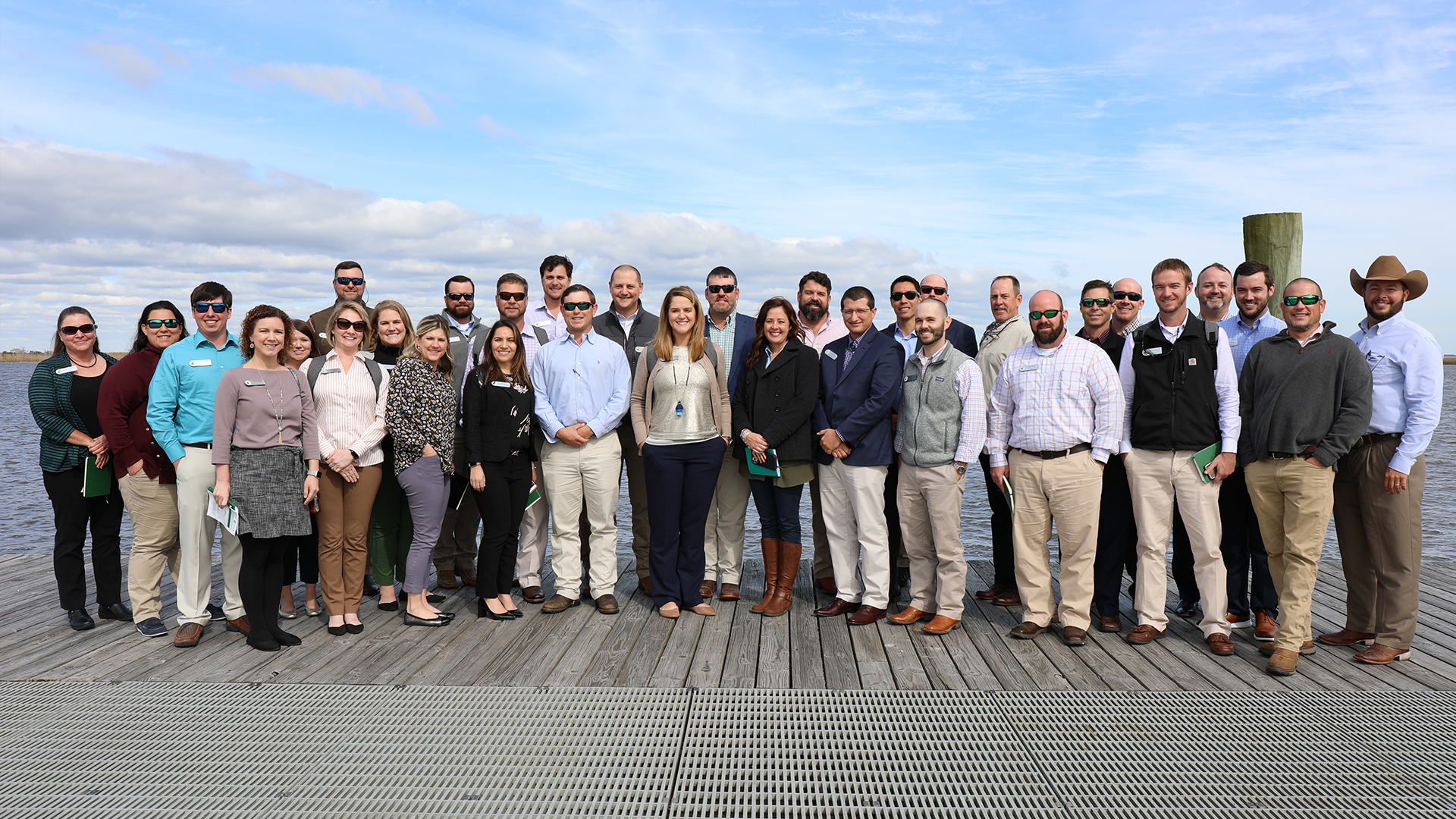
Knowing Your Why
2020 – a new year, a new decade! The perfect season to reflect on where you’ve been and where you’re headed. In the day-to-day rush of checking things off a to-do list and moving full steam ahead, it’s easy to lose sight of why it all matters. Our busyness keeps us focused on “what’s next”, but we must be intentional on remembering “why me, why now?” Simon Sinek does a great job sharing about Finding Your Why.
Why leave your business, your family, your responsibilities for 55 days to travel throughout Florida, the country and the world? Because we believe deeply in the future of Florida agriculture and natural resources. And we believe each of us has a responsibility to secure its future.
As part of Class XI’s responsibility to do their part, they spent time in Tallahassee and the Panhandle exploring the leadership theme of resiliency. Resiliency is a key component of individual leaders and broader industries. In Seminar II, we saw first-hand the hardiness needed to survive in both the policy arena of Tallahassee and in the rural fishing communities of The Forgotten Coast.
In her article, Why Resiliency is Necessary as a Leader , Amy Modglin outlines four key ideas related to resiliency. My favorite line in this article is “It is impossible to demonstrate resilience unless you have gone through difficult times.” If we remain focused on our “why” and understand difficult times build resilience (if we let them), then collectively we are a powerful force for agriculture and natural resources in our state.
Another exciting development for 2020 is WLI is hiring a leadership programs coordinator to assist with program development and support the Alumni Association of the Wedgworth Leadership Institute (AAWLI). We have three strong candidates interviewing in the next two weeks: Jennifer Facenda, Anne Schwartz and Rebecca Lovett. We are offering videoconferencing to the seminar part of their interviews to all current class members and alumni.
Enjoy Seminar II’s Wedgworth Wire!

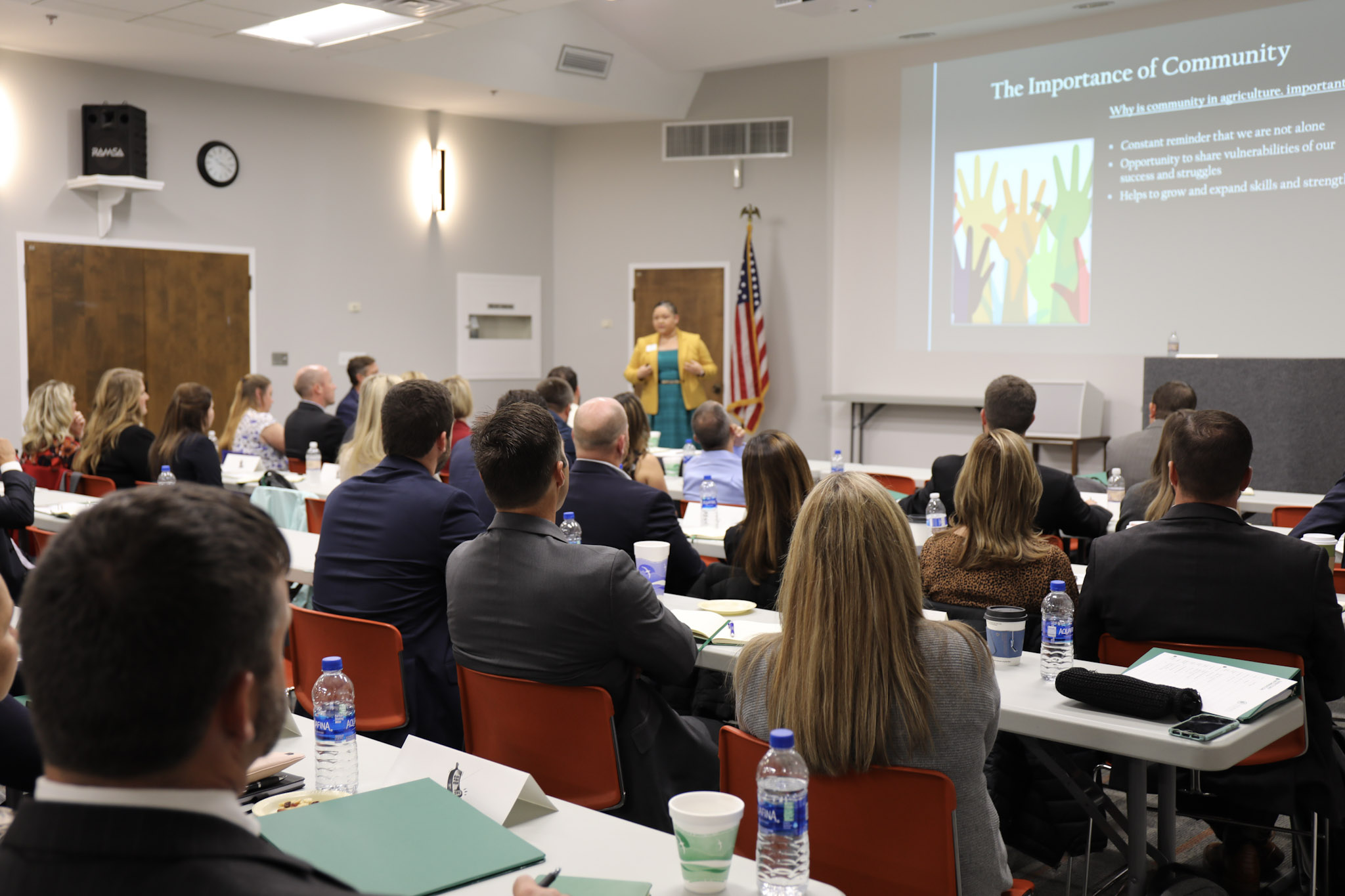
AgriCULTURE
I couldn’t help but notice two common themes between the group of thought provoking and inspirational speakers during Seminar I of the Wedgworth Leadership Institute Class XI: culture and core values.
Culture is important in our daily occupation and industries we serve. However, it’s important to everyone’s experience in Class XI. The Wedgworth Leadership Institute is well known for its culture built by numerous leaders, mentors, and enthusiasts for Florida Agriculture.
Dr. CC Suarez spoke about the importance of understanding the culture involved in agriculture. One of my most memorial experiences throughout the week was hearing everyone’s unique perspective and story in their industry. Oftentimes we get tunnel vision and focus on one industry without learning what our peers in agriculture are also experiencing. “The Danger of a Single Story,” by Chimamanda Ngozi Adichie does a great job of explaining just how important this experience is.
The culture is the personality of a company or organization. Culture defines the reputation for the organization, and I would say the future of the Florida’s agriculture industry is in good hands with the culture and values Class XI entails.

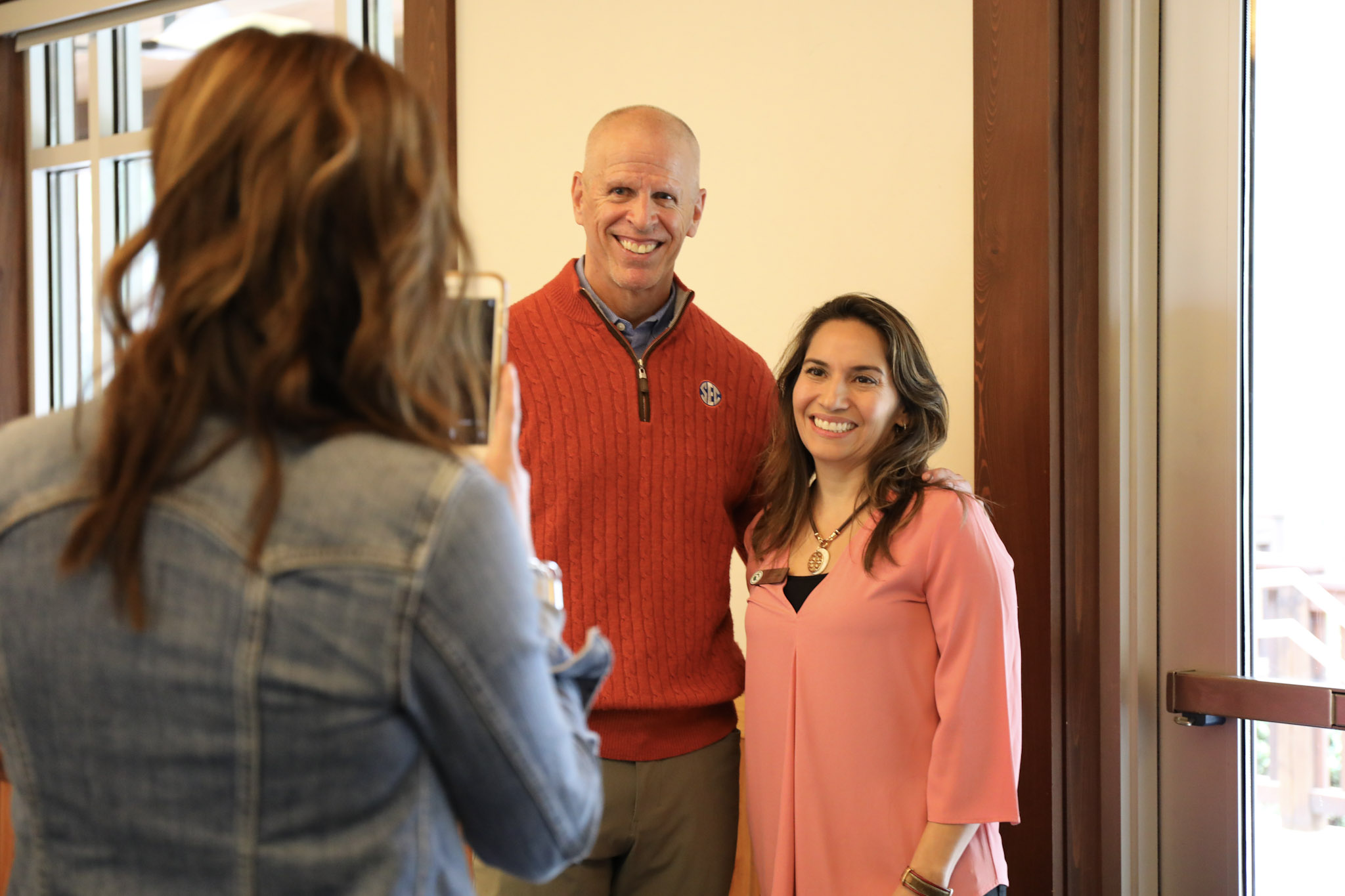
Aha Moments to Athletic Directors
Life has a funny way of bringing things together, making sense out of the silly things and experiences encountered along the way. Life also has a way of teaching us about the important things, how trust, integrity and self-evaluation is critical if we choose to be effective and great leaders of our time. Nelson Mandela once said “The greatest glory in living lies not in never falling, but in rising every time we fall”, and boy did Class XI learn on day 3 how leaders can rise and fall throughout life.
We kicked off the morning in Austin Cary Forest at the Stern Learning Center with an eye opening presentation on “stress”, and how many leaders go about it all wrong. Did you know that stress can actually be used as motivation, and if managed correctly, can be viewed as a strength? Although stress affects everyone differently, there are techniques to changing our behavior, which changes our thoughts, and essentially the mood we are in, but all closely correlated to the level of stress we are experiencing.
However we choose to deal with stress, it is important to practice mindfulness meditation, avoid burnout at all cost, and always take time to reflect on recent events.
10 Strategies of Reflection
- Making Metaphors
- Role Taking
- Journal Writing
- Peer Leadership
- Fish Bowling
- Quote Response
- Thinking Aloud
- Positive/Negative
- Imaginary Videotaping
- Devils Walking Stick
Class XI had the honor and unique experience to meet one of the greatest legends in the history of University of Florida Athletics. Mr. Jeremy Foley, the UF Athletics Director Americus shared with us his rise and fall as a leader. He expressed that everyone has to have an intentional desire to be a leader, and that leaders are made, not born. It takes work, it takes integrity, you have to be trusted, and you have to show your followers that you care about them as individuals, as well as the task at hand.
Developing culture in a program is the key to a successful organization.”
Jeremy Foley
As Class XI wrapped up photo opportunities with the man responsible for 27 National titles in 10 different sports for the University of Florida, spouses trickled in for lunch and the afternoon session.
Have you ever wondered why your spouse carelessly installs the new roll of toilet paper facing the wrong direction, or how he/she can maintain the speed limit in a car while driving, even though you are running extremely late for a very important event? What does the Cyndi Lauper song “True Colors” have to do with leadership? Well, fortunately there are personality types in all of us that are very similarly grouped in 4 colors. Dr. Joe Joyce, gave us all that “AHA” moment as he explained the four personality types in his presentation of “ What Are Your True Colors?”, followed by a strengths discovery presentation by Ms. Megan Stein, Lecturer at the UF Department of Ag Ed and Communication.
Although tired and worn-out from the long day of learning, the excitement of meeting the extended Class XI family filled the room of the Farm Credit of Central Florida building. A huge applause to Mr. Jeffery Spencer, Mr. Zak Seymour and staff of Farm Credit, who could not have been more hospitable, preparing for us one of the finest slabs of bovine we have ever enjoyed.
At the completion of the feast, we each had the ability to share photos of our family and tell stories along the way. Although some were extremely funny, others had us all fighting back tears as we learned some of the health battles and recent losses of loved ones. This night was a defining moment, a huge step in the lifelong relationships we are going to build with each other along the way.


How Diversity Ties Us All Together
One of the greatest limitations I have in my life is that I view things only through the lens of my own outlook. When something occurs in my domain, it is typically viewed solely through the impact it has on me and my surroundings. What if we could view these happenings through a different focal point?
So how does this tie into visits to a hospital, community organizations, a downtown revitalization project, and even an etiquette class? And, why would diversity matter in any of this?
Buckle up for day 2 of Class XI with the Wedgworth Leadership Institute.
Ed Jimenez, UF Health
It’s more about what someone hears than what I say. People don’t always listen, but they always watch.”
Ed Jimenez
Ed Jimenez, CEO of UF Health, kicked it into high gear at 8:00 sharp. With a $1.8 billion budget, eleven thousand employees, and a hospital kitchen second to none, he threw out the following leadership nuggets:
- Know your purpose. Leadership starts with purpose.
- The “why” may be very different for everyone
- Have perspective in understanding why each person does what they do
- Managers have “hard skills”. Leaders have “soft skills”.
- Facts, facts, and more facts.
- Informed decisions come from facts
- Know the why, not just data
- Lead by example.
- If you choose management, take responsibility.
- Communicate well.
“If you are not happy with average, do better.”
Ed Jiminez
Mr. Jimenez challenged us all to look at those we walk the halls with, serve with, work with, or even our day-to-day employees and understand that what we do on a regular basis affects each person we come in contact with.
After UF Health, we ventured out into the Gainesville community to visit various nonprofit organizations looking to influence the human landscape of their area. This included a homeless resource center, a center to help end sex-trafficking, an organization to help keep the county clean, a place to help empower young girls, and a working food center to help end local hunger. And, this was all just in one town.
Are you like me and are maybe unaware that similar groups are working in our own neighborhoods to change the world around us? Am I even aware that there is such a need in so many diverse situations? Do I look the other way? Do I even see these people? Am I even looking for them? Do I go to the neighborhoods that these individuals frequent? What can I do to help these groups? What do these organizations need from me or how can I help influence change? What am I doing today or tomorrow to make a difference with these organizations? How can I use my influence, connections, resources, or leadership skills to make my community more livable? Am I willing to fill the gap?
We as Class XI were able to spend some time wrestling with these questions. While working through all this, we sat in a downtown venue and were mesmerized as the story unfolded about how a downtown park came to be from a vision of a few people. In what once was a decrepit old swamp now stood a testament to a vision, a dream, a renaissance. In the place of a mosquito trap now stood a community park, a gathering place, a venue for groups to intermingle, a chance for families to fly a kite, and a place for future dreams to be cast.
In this same venue, we had the chance to learn about connection through etiquette:
- Social vs Business Etiquette
- Why should I care? 1st Impressions matter!
- Names hold meaning
- Introductions have order
- Appearance matters
- Telephone etiquette and handwritten notes show you value others
The purpose of etiquette is to make others feel comfortable.
Day two challenged us to think about our responsibilities as leaders in our own communities. Here’s some questions to reflect on regarding your impact and responsibility:
- Am I making it personable with those I associate with?
- Am I seeing my neighborhood and those I can help influence?
- What am I doing today to make life better for my community and make it more livable?
- Am I seeing the vision and dream for a “swamp” in my community?
- Am I leaving a lasting impression with those I associate with?
- What can I do to make a difference in the lives of others and leave a lasting impression on my community?
- What am I doing, changing, learning that will make others feel comfortable?

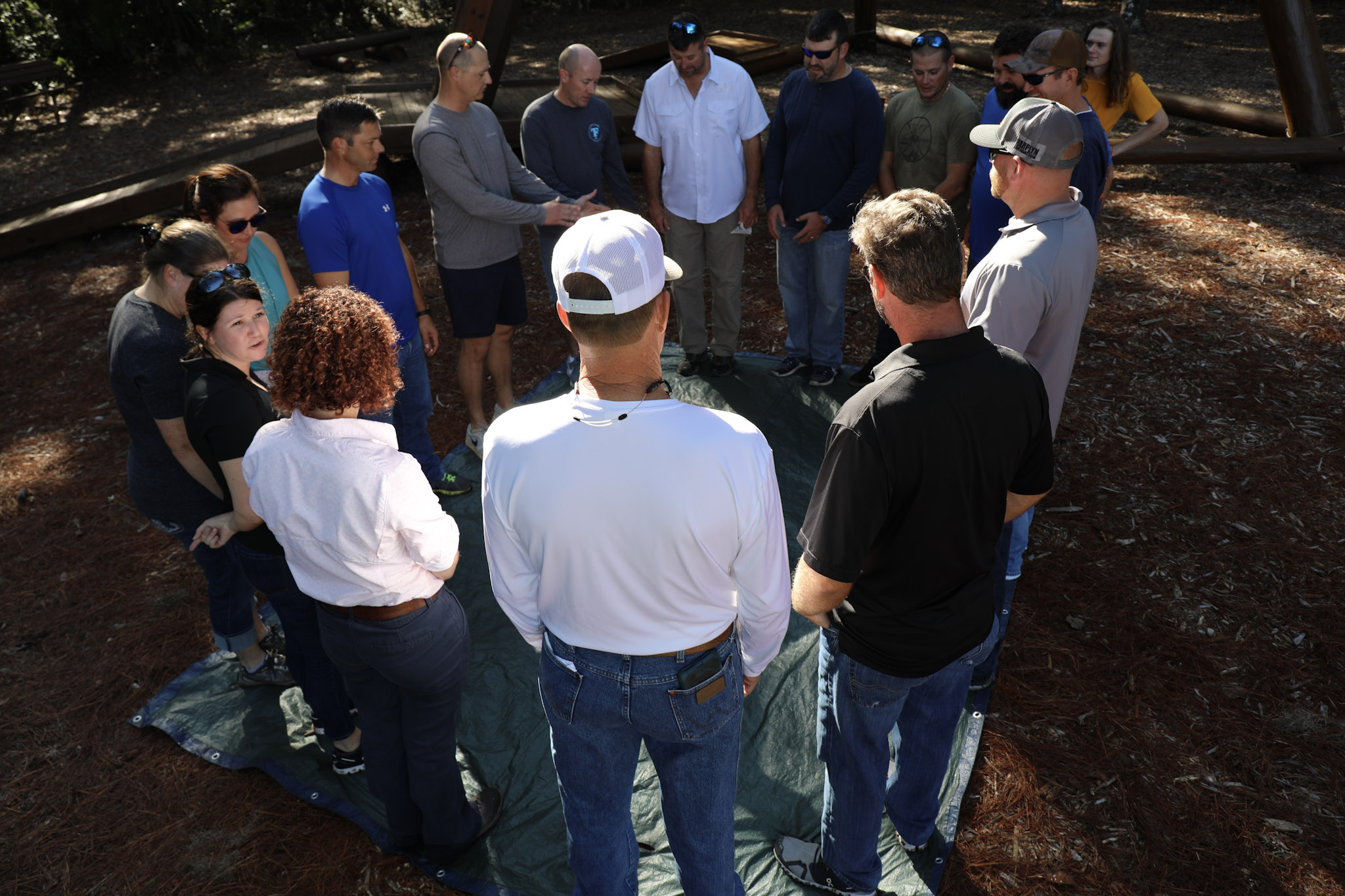
Day 1: From Strangers to Tears in 12 Hours Flat
Who knew you could take 30 complete strangers, add in a couple team-building challenges, rubber-play toys, Legos, and a personal item and bring these unique individuals to tears in less than 12 hours? That is just what occurred with the kickoff of Seminar I of the Wedgworth Leadership Institute’s Class XI. Here’s how it quickly added up:
30 strangers meet up at 9 AM at Lake Wauburg, south of Gainesville to learn who we will spend the next 22 months with,
THEN break them into teams with rubber play toys, tarps, team building exercises, an obstacle course with blindfolds, water cans and Legos,
NOW we know who we are teammates with and begin to glimpse just how cool this group is going to be interacting with.
Take these 30 now-teammates that did not know each other 12 hours previously, gather for an afternoon session on leading with humilty, and then take part in a meal graciously hosted by Florida Farm Bureau that evening.
THEN have them each bring a personal item to tell about themselves.
NOW you have tears, vulnerability, and a closeness to teammates that is something I have never seen come together so quickly.
After spending the day learning names and getting to know each other, we each shared a personal belonging that was special to us. Whether this was about a special pocket knife passed down from generation to generation, a very personal item maybe sacred or reminder of a parent, a Christmas ornament, a pair of work boots, a special memento necklace as a reminder of a dad passed too soon, a belt buckle or two, the wrist band announcing the birth of a brand new baby, or simply an item as a reminder of where we came from. All led to a connection of a team ready to see our communities and world in a whole new light.
“Team 11” is off to a great start. We now know who our teammates are, the names they will go by, and who forgot to wear deodorant the first day.
The Class 11 team of the WLI – the class so great that we require two #1s!


Temptations of Talent
Growing up, I was not very good at sports. To be transparent, “not very good” is giving myself grace. First, it was soccer. My asthmatic lungs whimpered each time the ball soared past me. Next, I tried out softball. I am convinced my hand-eye coordination gene has a permanent “out of order” sign. Then, my parents enrolled me in tennis lessons. Again, flying objects? Not a highlight of my childhood. What did I do? I quit. First, soccer then softball and finally tennis. I do not recall how I introduced the idea of quitting each time, but I clearly remember how my parents reacted. Initially, I was met with disappointment. The disappointment would merge into offers of private coaches and additional lessons. My refusal transformed into new sports pamphlets conveniently arriving on the kitchen counter.
At ten-years-old, I had to take ownership of my apparent lack of talent. I crushed my father’s dreams of proudly waving down at me as I accepted an Olympic gold medal on behalf of the United States. Looking back at this time in my life, this should have been obvious to my parents. I run at the pace of a turtle stampeding through peanut butter. I would beg to be taken to the library and was disappointed when I was brought to the playground. I was talented in a lot of areas. Athletics was not one of them. My parents overlooked the evident signs of my lack of ability with the blissful hope that I could be coached or trained to be great.
This seems like a simple concept. Do not make someone do what they are not good at. However, most organizations are built on the same blissful hope of two inaccurate assumptions:
- Each person has the ability to be competent in almost anything.
- Each person has the biggest room to grow where they are weak.
These assumptions guide why organizations spend so much time and resources training people to gain necessary skills rather than hiring and using those who already have them. Think of it this way – your organization has money set aside to send one employee to public speaking professional development training. You are trying to decide between two people – the one who naturally gives presentations well or the individual who has a challenging time conveying their thoughts publicly. Who do you send? Most people gravitate towards the person who has a weakness in public speaking. However, when it comes time to ask one of them to speak on behalf of your organization the person with natural talent is often selected.
Organizations are at their strongest when people are doing what they are good at. Through interviews with top global performers, Clifton identified that talent is innate. Through an investment of time and energy, those who are naturally talented can master or perfect their craft. With the same investment, individuals who do not possess the talent may show improvement; however, this will not be equivalent to those who already start with the innate ability.
We are often tempted to ignore our talents. We know the three areas that we struggle but overlook the ten where we naturally excel. Focusing on one’s weaknesses will prevent failure, but it will never encourage success. To be successful, you must manage your weaknesses but invest in your talents.
Managing weaknesses and focusing on weaknesses are very different tasks. Those who manage their weaknesses reach out to individuals who are skilled in areas where they are weak. You rely on your team rather than yourself when you know it is not an area you excel in.
As leaders, it can be challenging to give up control and ask for help. We often think that relying on others shows that we are lacking. However, the sign of a true leader is one who has their organization’s best interest in mind. Using self-awareness to illuminate areas where you need help is a foundational piece to being an authentic leader.
Identifying weakness takes strength. Be proud of where you are strong, and identify those who can help you where you are weak.
Thoughts to reflect on:
- What are the areas in your life where you should rely on others’ help?
- How are you investing in your talents?
- How are you encouraging those around you to invest in their talents and become the best?
Clifton Strengths perspective adapted from Now, Discover Your Strengths (2001) by Marcus Buckingham & Donald O. Clifton.
Clifton Strengths for Class XI
- Responsibility – individuals who are committed to what they say they will do
- Achiever – those who work hard and take great satisfaction from being busy and productive
- Ideation – people who are fascinated by ideas
- Deliberative – those who take serious care in decision making and choices
- Arranger – individuals who can organize, but combine resources for maximum productivity
Futuristic – people who are inspired by the future and what could be
Analysis:
With 278,256 unique combinations of Clifton Strengths talents, Class XI is one of a kind. What does this combination of themes mean for the leaders embarking on their journey with the Wedgworth Leadership Institute? With four out of six talents in the executing domain, Class XI is exceptionally talented in making things happen. Those with talents in the executing domain work tirelessly to make an idea come to life. Paired with the remaining two strengths in the strategic thinking domain, Class XI also has the ability to think through possibilities and analyze opportunity.
For Class XI to transform their talents into strengths, it requires effort. One must be willing to intentionally invest their time, effort, and energy into their talents. Think through how you have used your talents in the past week. What tasks did you complete that came naturally to you? Did you receive a compliment on any task you have completed? What contributed to you having a great day? If any of those answers came quickly to you, perhaps it’s because you were naturally flexing your talents. As individuals in leadership roles, we must channel what makes us talented and how we can uniquely serve those around us.
Thoughts to Reflect On:
- How can you plan to invest time in your talents in the next two weeks?
- What talents, from Class XI or in general, accurately represent Florida’s agricultural and natural resources industries as a whole?
For more information regarding Clifton Strengths, please feel free to contact Megan Stein, mstein17@ufl.edu.



You must be logged in to post a comment.